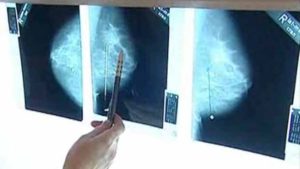Interesting article about potential low-cost effective cancer treatments that Big Pharma is not researching because there is no profit in it for them. From Pacific Standard:
The War on Cancer: Big Pharma Is Keeping Us From Developing Low-Cost Treatments
Big Pharma’s focus on blockbuster cancer drugs squeezes out research into potential treatments that are more affordable. Says one researcher: “What is scientific and sexy is driven by what can be monetized.”
Numerous laboratory, animal, and small human studies suggest that low-dose, continuous chemotherapy holds promise in shrinking tumors and preventing cancer’s recurrence. But the next step—testing what Retsky did in a large-scale clinical trial—is a long shot given the way cancer treatments are developed today.
Take Michelle Holmes, an associate professor of medicine at Harvard Medical School. She’s been trying for years to raise money for trials on the effects of aspirin on breast cancer. Animal studies, in vitro experiments, and analysis of patient outcomes suggest that aspirin might help inhibit breast cancer from spreading. Yet even her peers on scientific advisory boards appear uninterested, she says. “For some reason a drug that could be patented would get a randomized trial, but aspirin, which has amazing properties, goes unexplored because it’s 99 cents at CVS,” says Holmes.
Increasingly, Big Pharma is betting on new blockbuster cancer drugs that cost billions to develop and can be sold for thousands of dollars a dose. In 2010, each of the top 10 cancer drugs topped more than $1 billion in sales, according to Campbell Alliance, a health-care consulting firm. A decade earlier, only two of them did. Left behind are low-cost alternatives—therapies like Retsky’s or existing off-label medications, including generics—that have shown some merit but don’t have enough profit potential for drug companies to invest in researching them.
The newer drugs have in some cases shown dramatic life-extending results for patients. Yet cancer remains the second-most-common cause of death in the U.S. after heart disease, killing about 580,000 people a year. Worldwide, 60 percent of all cancer deaths occur in developing countries, where experts say the incidence of the disease is growing rapidly, as is a desperate need for affordable care. That has added urgency to an active debate about whether efforts to combat cancer—and where to put scarce research dollars—need to be rethought.
Sukhatme and his wife Vidula, an epidemiologist, are among those trying to do something about it. They have spearheaded a new non-profit, Global Cures, to promote alternative treatments that are unlikely to attract commercial interest from drug companies. Global Cures calls these forsaken therapies “financial orphans". To help patients and their doctors, the non-profit is producing reports that explain the science behind promising orphan therapies—those that have shown merit in animal studies and limited human data. And Global Cures also has set itself a more challenging goal—to find the money for clinical trials.
Creating an innovative new drug—including everything from early research to late stage trials—costs on average of $1.3 billion, according to the Tufts Center for the Study of Drug Development. Nonetheless, drug development in the United States, even when it is funded in part by taxpayer dollars and encouraged by federal bureaucracies, isn’t geared toward inexpensive alternative treatments.
The NIH, particularly through the National Cancer Institute, contributes to about 15 percent of all clinical trials related to cancer, but the amount it gives is in decline. The agency instead partners with pharmaceutical companies or academic institutions, and the trials the NCI does support usually are for new drugs, not for re-purposing existing ones.
Low-cost alternatives like aspirin must fight for consideration within a scientific community that is producing effective cancer drugs that can command $100,000 or more for a course of treatment. The escalating prices for these drugs worry many involved in the fight against cancer. Some of the new drugs will eventually be used in combination, a step that could push cost of treatment into the hundreds of thousands, says Lichter.

 This exciting research opens a whole new way of thinking about the female breast and breast cancer. First of all, note that
This exciting research opens a whole new way of thinking about the female breast and breast cancer. First of all, note that